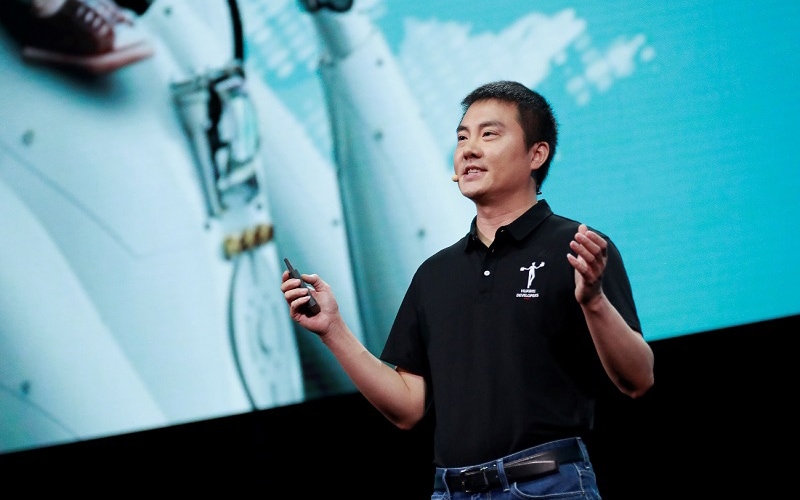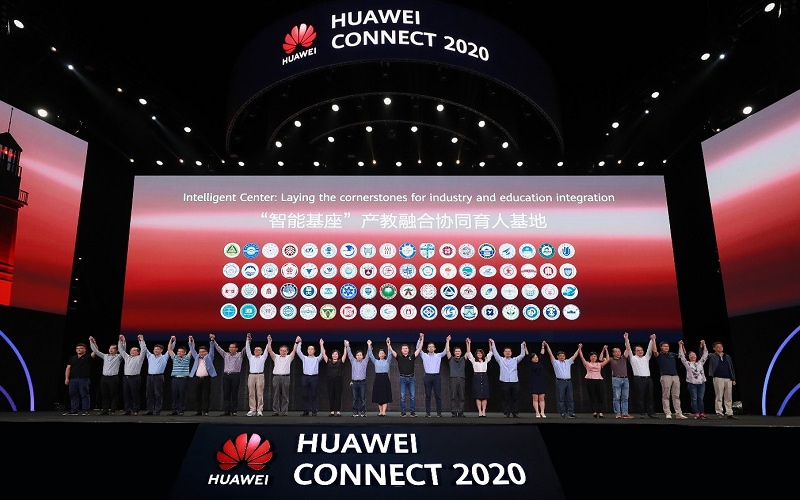Diversified Computing: Open Innovation for Shared Success
At HUAWEI CONNECT 2020, Huawei announced that it will open up the full-stack Kunpeng and Ascend and launched the distributed diversified computing software suite to the industry. These open source technologies are designed to catalyze industry innovation and enable simplified development, allowing Huawei to achieve shared success with industry partners in the new computing era.

Deng Taihua
Photo of Deng Taihua
Thriving Kunpeng and Ascend Industries
2019 saw Huawei announce the computing strategies of open hardware, open source software, and partner enablement. Over the past year, Huawei remains committed to these strategies and continues to advance the Kunpeng and Ascend industries together with industry partners. The close collaboration between Huawei and partners has empowered a new era of diversified computing.
Huawei sticks to the Partner-First approach. It opens motherboards and components, as well as technology capabilities, to enable hardware partners to build self-branded products. The hardware and expertise openness has yielded fruitful results. For example, in June 2020, the shipment of partners' servers had exceeded that of Huawei servers. In terms of open source software, Huawei has made openEuler, openGauss, openLooKeng, and MindSpore go live as scheduled. Based on these open source versions, software partners have launched commercial releases and applied them to key industries and projects. The Kunpeng and Ascend industries thrive rapidly and comprise nearly 300,000 developers, more than 1,000 partners, and over 3,000 certified solutions.
Addressing Explosive Growth of Computing Power Demands with Open Innovation
We are moving into an intelligent world where all things are connected and the computing requirements explode. We used to improve the chip process for higher computing power, but now to meet the mass computing requirements we need to innovate the computing architecture from the ground up. To embrace this challenge, Deng Taihua, President of Huawei Computing Product Line, illustrated the ideas of Huawei in his keynote speech. ''The innovation is open, including the combination of general and heterogeneous computing, and covers the full stack of hardware, basic software, and application enablement. With Kunpeng and Ascend, Huawei provides diversified computing power, embraces full-stack innovation, and works with partners and developers to advance the computing industry ecosystem. We wish to join with every developer and blaze the trail forward, together fostering an open ecosystem for diversified computing''.
Full-Stack Kunpeng: Opens up Huawei's Capability to Spur Industry Innovation
To spur industry innovation, Huawei announced that it will open up the full-stack Kunpeng, including the Kunpeng motherboard 2.0, new versions of openEuler and openGauss, Kunpeng BoostKit for application enablement, and Kunpeng DevKit for full-pipeline development.
The Kunpeng motherboard 2.0 is opened up in the form of basic board + extended board + open BIOS/BMC. This new pattern of hardware openness aims to facilitate the differentiated innovation of partners and help partners build differentiated and competitive device products for different industry scenarios and applications.
openEuler is an operating system dedicated to community collaboration, innovation and diversified computing. The newly released version combines diversified computing power with the ultimate performance, enhanced security and trustworthiness, and open ecosystem. openGauss, another software product, is an enterprise-grade database with a kernel that features high performance, reliability, and security. It is an ideal option for partners who want to improve enterprise-grade features while steadily promoting the commercial use of databases.
To strengthen application enablement, Huawei debuts the Kunpeng BoostKit, an application enablement kit that provides open source high-performance components, acceleration software packages, and tools/reference implementation for mainstream scenarios. Developers can directly use them to achieve high application performance. Another showpiece product launched by Huawei is the Kunpeng DevKit. It supports the full-pipeline development by enhancing the Code Scanner, Porting Advisor, and Tuning Kit. The newly released BiSheng Compiler and the porting tool without source code run on a plug-in design, allowing them to adapt to mainstream integrated development environments (IDEs) for efficiency boost in full-pipeline development.
Full-Stack Ascend AI: Unlocks the Ultimate Simplicity and Performance to Fuel Innovation
The Ascend AI full-stack innovation aims to provide developers with a full-stack AI solution that boasts the ultimate simplicity and performance. This solution enables AI developers to tackle challenges that arise during algorithm development, application development, and service deployment.
Having dedicated to innovating the Atlas hardware, Huawei takes one more step forward to launch the full-stack software platform that comprises the Compute Architecture for Neural Network (CANN) 3.0, MindSpore 1.0, MindStudio 2.0, and MindX 1.0.
CANN is the core of AI computing hardware. It boasts the following highlights:
Inference and training in all scenarios across device-edge-cloud
Three innovations, that is, the enablement of all scenarios, the ultimate performance, and simplified development
One-time development and flexible deployment on various hardware form factors in all scenarios
A unified programming API ACL for all hardware series for inference and training
Optimized software/hardware collaboration for powerful hardware performance
MindSpore is an AI computing framework for all scenarios across device-edge-cloud. The newly released MindSpore 1.0 supports fully automatic parallelism of models, operators, and hardware processing units. It enables adaptive all-scenario deployment, and cross-heterogeneous hardware execution without model conversion. With MindSpore 1.0, the E2E development process is simplified because models pre-trained by third-party frameworks can be automatically converted.
MindStudio 2.0 is a toolchain that provides developers with full-pipeline support, ranging from operator development and model training to inference, application development, and deployment. It runs on a plug-in design and is easy-to-install.
MindX 1.0 allows developers to implement AI functions with only a small amount of code or even without code. It consists of the deep learning component MindX DL, intelligent edge component MindX Edge, pre-trained model library ModelZoo, and X industry enablement SDKs.
Releasing Distributed Diversified Computing Software Suite
Diversified computing and distributed applications will be the norm in the future. Before converting diversified computing power into high-performance distributed applications, developers need to tackle a series of challenges, including:
Leveraging the advantages of many-core computing power
Combining diversified computing power with applications in an optimal manner
Improving the parallelism performance of distributed applications
Achieving the linear increase of application performance as the system scale grows
Solving the issues caused by converged application development, such as the high learning costs and cross-system collaboration
To help industries address these challenges, Huawei releases the distributed diversified computing software suite that features the simplified application of diversified computing and the efficient development of distributed and parallel applications. This tool efficiently unleashes the potential of diversified computing power and helps distributed applications create value. The suite consists of three key components, including the cluster acceleration library, unified scheduler, and distributed parallel application development framework.
The cluster acceleration library covers all diversified computing scenarios and interconnects with mainstream distributed application ecosystems. It is empowered by groundbreaking algorithm innovations to help application developers address the performance challenges caused by mass data, distributed communication, and multi-core parallel processing.
The unified scheduler for diversified computing power and loads supports large-scale and efficient resource collaboration across domains. It can also integrate AI with the big data application ecosystem without code intrusion, and achieve the resource collaboration of public cloud and across data centers.
The distributed parallel application development framework based on function computing helps developers define the development and running modes of high-performance parallel applications in a data center. It enables developers to program on a large-scale distributed system.
Cultivating Talent to Cultivate the Industry
establishment of the Center
Photo of the establishment of the Center
The talent cultivation in the digital age is based on basic theories and needs to embrace the latest technology trend and market requirements of the industry. Talent cultivation requires the collaboration of multiple parties to create a healthy talent ecosystem, where each party draws on its respective advantages to vitalize the basic education and promote industry-specific practices.
Against this backdrop, Huawei has partnered with the Ministry of Education and 72 universities to set up the Intelligent Center for AI talent cultivation. The Center is the result of industry-university-institute collaboration, paving the way for new talent to lead the next evolutionary phase of computing industry. Huawei, together with Tsinghua University Press and various leaders from prestigious universities, has published tutorials and serial teaching materials to disseminate the latest knowledge of Kunpeng and Ascend to teachers, students, and developers. Looking forward, the further collaboration with universities will help develop courses in Kunpeng- and Ascend-related fields. In 2020, Huawei has launched the pilot Kunpeng- and Ascend-related courses in more than 20 universities. By 2021, these courses will be offered to over 70 universities in China, with plans to extend to over 2,600 universities and higher vocational colleges across the country.

HUAWEI CONNECT 2020 is an annual flagship event hosted by Huawei for the global ICT industry, and is being held in Shanghai from September 23 to 26, 2020. HUAWEI CONNECT is an open platform designed to help our customers and partners navigate these changes, share experience, and work together to create new value. At this year's event, we will explore trends and opportunities in industry digitization; showcase advanced ICT technologies, products, and solutions; give you an insider's look at the fruits of joint innovation; and share best practices in digital transformation. Our ultimate goal is to build an open and sound industry ecosystem that will benefit all stakeholders and create new value for all industries. For more information, please visit: www.huawei.com/en/events/huaweiconnect2020/






No comments: